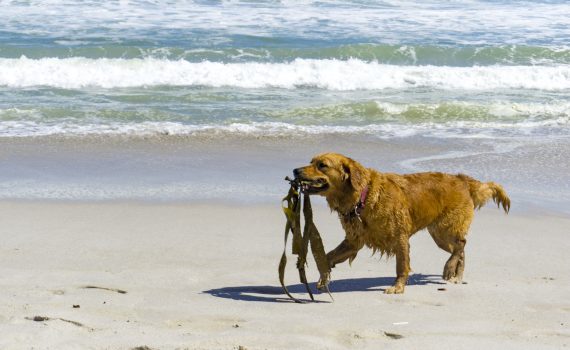
Sea Vegetables for Dogs & Cats
By Carol Kendig
Without a doubt, cats are Obligate carnivores and need little to no vegetable matter in their diets. And dogs are Facultative carnivores, meaning their bodies can process some plant foods but are primarily meat eaters and need a protein-rich diet to thrive. But by adding small amounts of functional vegetables and fruits to our pet’s protein-rich diets we can greatly enhance the health benefits of their meals. Here at Northwest Naturals, our cat recipes are 98% protein and 2% added natural powdered supplement, while our dog recipes are 80% protein with 18.5% added vegetables/fruits and 1.5% natural powdered supplement. So where do sea vegetables fit into this equation?
First, What are Sea Vegetables?
This broad heading includes all the different types of seaweed and algae growing in marine environments. With over 70,000 species identified, the focus of this article is on the 2 most studied species, which happen to be the 2 Northwest Naturals (NWN) included in our formulas: Kelp and Dulse.
Kelp
Kelp refers to many species of brownish-green seaweeds found primarily along ocean shores. These species use sunlight as an energy source, attaching themselves to rocks and growing quickly, making kelp a sustainable product that is easily harvested and naturally replenished. Full of healthy nutrients, kelp has a slightly salty taste which most people and their pets enjoy. Adding kelp powder to your dog’s or cat’s diet is a great idea because it is low in calories but one of the highest known sources of natural trace minerals, some hard-to-get B vitamins (folate, riboflavin, thiamine, and B12), iodine and vitamins A, C, E, and K.
Dulse
Dulse is a reddish–purple seaweed growing along northern cold-water ocean shores. It, too, is a sustainable source of significant nutrients for humans and their pets. While including the same benefits as kelp, dulse adds a higher protein and fiber content, offers more iron, and is considered more flavorful.
Both kelp and dulse are safe for pets to consume in monitored amounts such as are found in the Northwest Naturals natural supplement formula. Because of the rich iodine content of seaweeds in general, it would be wise to consult a veterinarian before adding additional kelp or dulse to a complete and balanced diet. If your pet suffers from low thyroid issues adding sea vegetables may be recommended as a natural support, but if your pet suffers from high thyroid problems no extra seaweed would be advised.
Benefits
Sea vegetables offer many clean, health-enriching benefits. If your dog or cat has dry skin, hair loss, and recurring skin allergies, adding a sprinkle of seaweed powder to their meals may prove helpful. Many show dogs are regularly supplemented with kelp/dulse to keep shiny, luxuriant coats. With over 60 minerals and trace minerals, kelp, and dulse boost our pet’s immune system, can improve digestion, and strengthen the nervous system. If your pet has eye problems, the high natural vitamin A found in both kelp and dulse will support eye health. And surprisingly, kelp/dulse fed daily in small amounts can help reduce plaque and tartar through the enzymatic activity of a beneficial bacteria found on the surface of kelp. Although there are numerous other health claims made for sea vegetables, one intriguing constituent is the presence of sodium alginate in kelp. Sodium alginate is a naturally occurring edible polysaccharide that is effective at protecting our bodies from radiation and removing it from the body. Not something we might need at this time but could be important in certain types of emergency situations.
Kelp and dulse are often called superfoods as their synergistic activity stimulates many bodily functions to work better. Check with your vet about possible contraindications involving thyroid problems. If there are no thyroid issues, add a sprinkle or two to your dog’s meals and a small pinch to your cat’s bowl. Sea vegetables, especially kelp, and dulse, are a valuable and relatively low-cost addition to your pet’s diet. Organic kelp stored in dark glass containers will last a long time and provide your pet with a healthier life. It’s an excellent choice for your health and happiness, too, because we are all happier when our pets are flourishing!